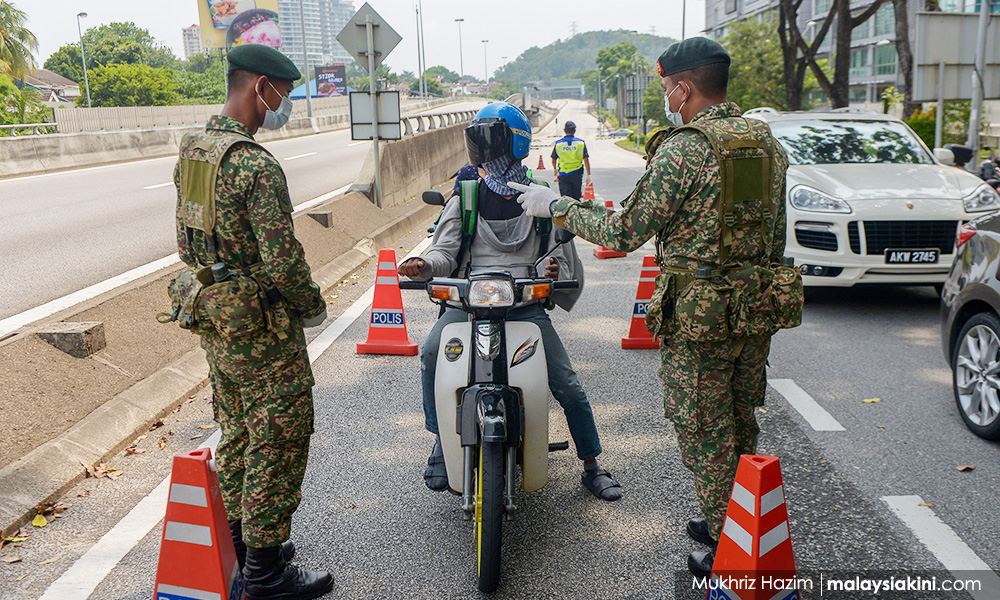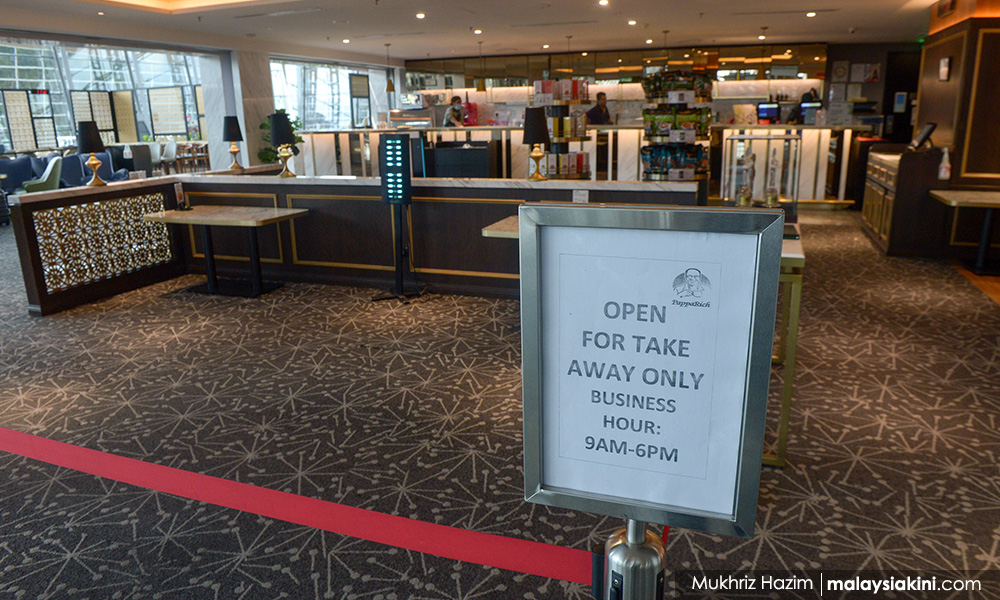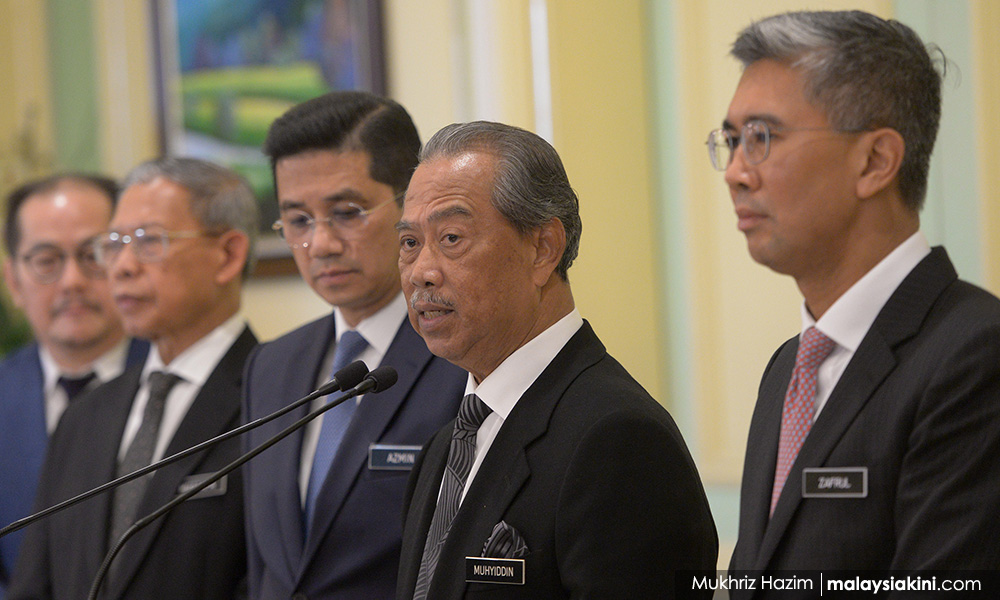COMMENT | The Covid-19 pandemic is arguably the most disruptive global event in recent times. It is unprecedented in its scale and potential impact on the economy and the quality of life.
We do not know the extent of this pandemic and how badly Malaysia will be affected, but the likelihood that this is turning into the defining crisis of our time is increasing with every passing day. By all accounts, it looks highly probable that the pandemic and its direct consequences will be with us for a while, possibly another 12-18 months.
The pandemic has to be addressed decisively, the plans to do so should be communicated clearly, and implemented in a way that improves the integrity of institutions in this country, and the people’s confidence in them. Maintaining the fabric of our society and the unity of the country are as important as managing the pandemic and its consequences.
The leadership of the country must be seen to be decisive and cohesive while having the interests of the people as its only objective. The wisdom and speed of decisions are of the utmost importance. This is not the time to be petty and partisan.
We will present our views in three parts, organised around three broad issues:
Managing the pandemic: immediate actions are needed to test, identify and treat the infected early, requiring trained and well-protected frontline personnel, resources and facilities.
Managing the affected: immediate actions to address those displaced and negatively impacted by actions to manage the pandemic while ensuring continued provisioning of basic needs, public utilities, and social services.
Managing the economy and preparing for the post-crisis environment: the decisions to manage the pandemic and those affected have consequences that need to be anticipated and managed.
In making these views and recommendations, we recognise that these are abnormal times, somewhat comparable to wartime. Normal considerations – of managing fiscal constraints, budgetary deficits, debt ceilings, growth targets or ratings agencies – do not apply. Malaysians come first. We should mobilise all the country’s resources to do whatever it takes.
Second, the governing principle to determine priorities should be:
- Frontline healthcare personnel get first priority.
- Beyond that, the principle of equity applies – that which benefits the most number of people must get priority.
- We need to recognise that there will be some slippage and compromises, but this is no time to insist on the perfect at the expense of the good and necessary.
We propose a “fiscal stimulus” for consumption smoothening to aid individuals and businesses during this difficult period – to prevent cash flow problems from becoming a solvency crisis that could cause massive unemployment and other related problems.
Managing the pandemic
While Covid-19 fatality rates are much lower than for other virus epidemics such as Nipah, SARS1 and MERS, it is highly contagious. Managing contagion requires early testing, isolation and treatment of the infected, especially the most vulnerable, who seem to be the elderly. Therefore, the strategy is about containing infections so that the healthcare system is not overwhelmed – the so-called "flattening the curve" approach.

Health Ministry (HOD) has put in place plans to build capacity, protect frontline staff, and flatten the curve with its movement control order (MCO) and to significantly widen testing, mobilising both private and public healthcare providers. Korea is an exception in not imposing movement restrictions, but it uses technology to track movements.
The government may want to consider measures adopted by the French government to help and protect frontline staff:
- All masks and protective gears are prioritised for hospitals, general practitioners, nurses and all support staff.
- Provision of transportation, lodging and accommodation for all frontline staff.
- Strong enforcement against profiteering on any protective and medical equipment and services, including testing.
While we are managing the current emergency, plans need to be in place for the next 12 to 18 months after we have successfully slowed down the infection rate and the MCO suppression strategy ends. This includes the need to build healthcare capacity for potentially lengthy treatment at home.
Communications by MOH, while generally professional, have had limited impact so far. Our recommendation is for communications to be prepared by medical professionals based solely on facts and science. However, much more needs to be done with both the traditional print and broadcast media as well as the new social media, especially to correct the considerable misinformation and superstitions which continue to be very influential and sometimes dangerously misleading. A dedicated taskforce needs to support MOH in this effort.
Managing the affected
An inevitable consequence of containing Covid-19 is that it will have significant adverse effects on the economy. Large-scale measures need to be in place to stop and reverse the economic decline.
(1) Individuals and households
The MCO has negatively impacted the lives of millions of households whose incomes and savings levels were low even before the Covid-19 epidemic. The MCO has cut incomes for many small traders who provide affordable sources of food and other supplies. For example, the pasar tani/malam is both a source of income for them as well as a source of affordable food and provisions for a great many households.
There are also those who have lost their jobs or incomes due to the MCO, including those who have been put on half-time work or no pay leave. For these individuals and households, the extension of the MCO will further undermine their livelihoods.
There must be immediate measures to put cash in the hands of those affected to sustain them through this period. The examples implemented by other governments in this regard should be considered. The MyKad, BSH database, as well as the e-wallet programme, are ready-made to implement such cash transfers. The recently announced Socso Employee Retention Programme can also be expanded significantly to compensate for job and income losses, which need to include the self-employed.
Beyond cash, those adversely affected by the MCO may require temporary housing and board; such facilities should be made available. There are cases of students and others displaced who have been stranded by the MCO.
(2) Businesses
Businesses have been significantly affected, including those fundamentally viable. Support needs to be directed to ensure that businesses can weather the situation we are in. This is especially true for SMEs – collectively the biggest employers in our nation. They employ close to ten million and have collectively borrowed over RM300 billion from banks. Alleviating their concerns allows more breathing room for our SMEs as well as the people they employ. The UK, for example, has guaranteed 80 percent of all employee wages up to £2,500. Although measures to protect SMEs were announced as part of the Economic Stimulus Package (ESP), more can be done to ensure continued access to financing.

For example, funds channelled to development finance institutions (DFIs) should be made available to all businesses. At the moment, we should be supporting the whole economy rather than just parts of it. After all, it is not only tourism-related sectors that have been adversely impacted. This is to ensure that the risk of business failure is significantly lessened. Every business is someone’s employer, supplier, and purchaser. In this testing time, we need to minimise business failures, especially of otherwise viable SMEs.
A quick way of providing relief to SMEs is via the use of government guarantees of loans extended by banks. This was successfully and efficiently used during the 2009 crisis via a MOF Inc company, Syarikat Jaminan Pinjaman Perniagaan Berhad, which manages the guarantees and work with banks.
Two types of services – government services related to registration, licences, permits, etc and utilities such as water, electricity and telecommunications – are still necessary for the economy, but charges for these services should be specially and temporarily discounted to ease cashflow concerns, both for households as well as for SMEs.
The government should form a collaborative platform with all companies providing these services to ensure continuous supply while also addressing the financial requirements of having to do so.
(3) Supply chains
Global supply chains had already been disrupted by trade conflicts before the Covid-19 outbreak. The Covid-19 pandemic and measures taken in response, especially restrictions on movement, have further disrupted such supply chains, so crucial to an open economy like ours.
We are concerned about food and other essential supply chains. Malaysia imports more than RM50 billion worth of food – from fresh vegetables to meat, grains including rice, and processed food. Mindful that many businesses operate with minimal inventory levels, disruptions in supply chains will definitely impact supplies at the retail end. Already, all three modes of transportation - air, sea and land - have been badly disrupted.
A list of essential food items and other essentials must be developed, and their supplies secured, anticipating that the present situation prevails for another 12-18 months. A strategic view of stockpiling may even be necessary to ensure food sufficiency.
At the very least, the country must secure the supply of domestically produced food sources, including poultry, eggs and others exported, as well as key imported food items partly produced nationally, such as rice, fish, vegetables and fruits.
Managing the economy and post-crisis reset
The economy may even contract this year regardless of efforts. There are bound to be dislocations. Jobs will be lost, and businesses will fail. It is also likely that the economic landscape when the global economy recovers from this pandemic will be different from last year’s.

The government must also consider addressing the dislocations caused by the outbreak. The dislocation of labour due to technological changes, which was already happening, may be accelerated by this pandemic, making future unemployment a major issue.
The state of government finances are expected to be bad. It was already bad and will be worse after this. The priority should be to generate growth.
It is also clear that we need better regional cooperation, economically and more broadly, both for future growth as well as to address similar crises in the future. The crisis also amplifies the importance of maintaining relationships with our major trading partners.
Communication and transparency
There is a great need to be transparent and to communicate more effectively – regularly and truthfully. Government communications must occupy the high ground and people must trust it. This is the time when trust is most needed; should the government decide to withhold information on crucial aspects of the health crisis for whatever reason, the breach of trust and credibility will have untold consequences.
Conclusion
This is a time for national unity and non-partisan politics. Our ability to address this pandemic and its immediate and ensuing consequences depends on the country’s resources. It needs much more than what the political leadership can offer. It needs every Malaysian.
The federal government has the most resources to plan and implement, but both planning and implementation must be done collaboratively with the states and non-governmental organisations. Speed of implementation is key, and should be decentralised as much as possible. Bureaucratic impediments should be minimised during this period.
We are deeply concerned by the seeming lack of clear and coherent initiatives by the government in light of the growing crisis. We were taken aback by the Treasury’s traditional balanced budget perspective as the rest of the world, especially East Asia, responds with a strong sense of urgency, recognising that this time it is different.
In 2009, following the Global Financial Crisis, the government introduced a stimulus package amounting to nearly RM60 billion. That package was to stimulate the economy following a financial crisis. Any package that we do now is not simply to stimulate the economy, it is to save lives and to protect Malaysians from a life and death health crisis. If we could spend RM60 billion to stimulate the economy from a financial crisis, surely we can spend more to protect all Malaysians from an unprecedented health crisis.
We hope our views presented above are useful and we are ready to further elaborate on them if required. We will be glad to be proven wrong, but we shudder at the prospects of being just half right. At any rate, we urge the government to show leadership and act quickly.
NUNGSARI AHMAD RADHI is the executive chairperson of the Malaysian Aviation Commission and chairperson of the Khazanah Research Institute (KRI) board of trustees.
HAMDAN ABDUL MAJEED is the managing director of Think City and former director at Khazanah Nasional Bhd.
MUHAMMED ABDUL KHALID is a former KRI director and was the prime minister's economic advisor during Pakatan Harapan's administration.
The views expressed here are those of the author/contributor and do not necessarily represent the views of Malaysiakini.
Keep up with the latest information on the outbreak in the country with Malaysiakini's free Covid-19 tracker.

